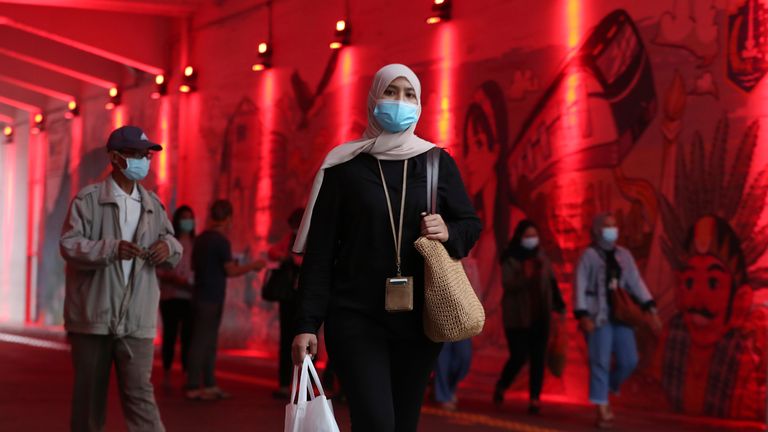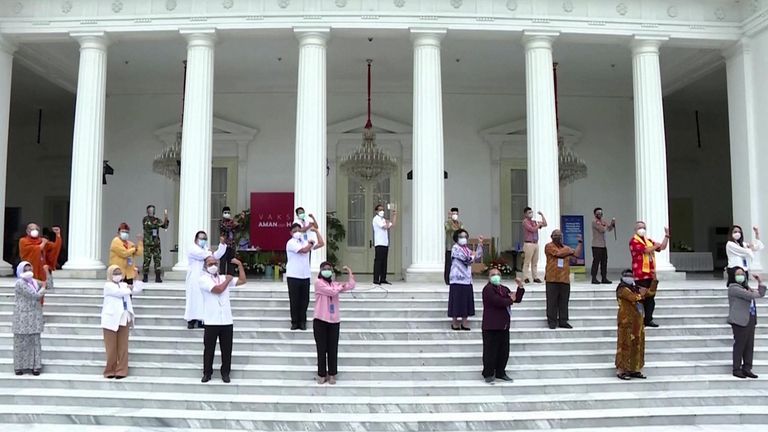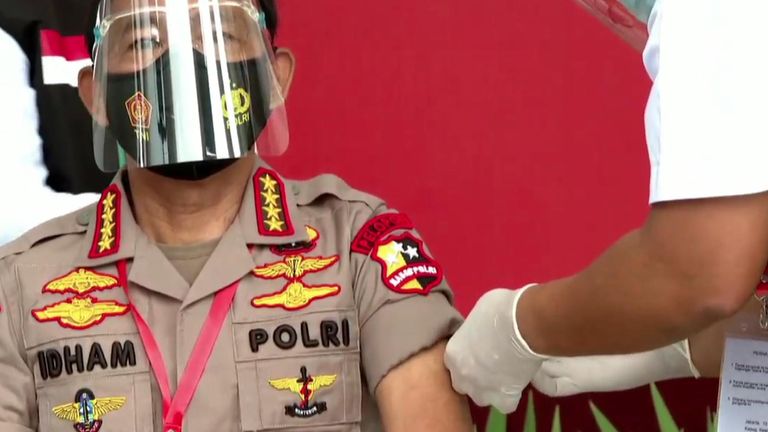With shaking hands, broadcast live to the nation, a doctor administered Indonesia’s first COVID-19 vaccination.
The recipient was President Joko Widodo, a man who hopes to get 181.5 million Indonesians vaccinated this year.
It’s a huge challenge, almost three times the population of the UK and so far one of the largest rollouts in the world.
But the nation’s vaccination drive, which started this week using CoronaVac, a jab from Chinese manufacturer Sinovac Biotech, bucks the current trend by injecting under-60s first.
You can find out more about Indonesia’s COVID-19 vaccine drive on the Sky News Daily Podcast
Subscribe to the Daily podcast on Apple Podcasts, Google Podcasts, Spotify, Spreaker
Dr Siti Nadia Tarmizi, COVID-19 vaccination spokesperson for Indonesia’s Ministry of Health, told Sky News: “18 to 59 is the age group that gets most infected by COVID-19 and mostly without symptoms. We know between 18 and 59 is a more productive age group, so if we are targeting this age group first, we will protect them from COVID-19, which means they can, of course, go to work.
“And then secondly, by protecting this age group, we will cut the transmission.”
Indonesia has recorded more than 24,900 deaths and 840,000 infections making it Southeast Asia’s worst outbreak.
Testing levels are low, so experts warn the actual infection rate could be much higher.
Starting with frontline workers, under-60s will be inoculated first not only because the government hopes protecting workers will boost the economy, but it’s also waiting for more safety data about how CoronaVac impacts the elderly.
In Indonesia’s capital city, Jakarta, where people who refuse the jab will face fines, some are wary.
“If I had the option to refuse the vaccine, I would say no,” said Guntur Dwi Adiputra, “For sure I will be afraid to have it because I don’t know the side-effects.”
“I understand the perspective economic reasons, however, I feel that those people, productive people, they could wait because they’re not the ones risking their lives first, the elderly are the ones at stake right now,” added local resident Angel Utomo.
Indonesia is the fourth most populous country in the world and the pandemic has left many struggling financially.
Mohammed Santri’s catering business previously sold more than 200 meals a day, but since the coronavirus outbreak it’s dropped to just 10.
The family now runs it alone after all the paid staff had to be let go.
“I hope that the vaccination process will be implemented as soon as possible because when people are healthy and they can go back to work then I will receive orders again,” Mr Santri said.
CoronaVac is easier for many developing countries to store than some of the other vaccines as it can be kept in the fridge.
Unlike the Pfizer and Moderna mRNA vaccines which have been given the green light in the UK, the Sinovac-made jab uses inactivated coronavirus.
Patients are injected with killed viral particles to expose the body’s immune system to the virus and teach it to make antibodies.
Interim data in Indonesia put the efficacy at 65.3% but extended results from Brazil found it to be just 50.4% effective, barely over the 50% needed for regulatory approval.
Researchers at Sao Paulo’s Butantan Institute who conducted the trials previously stressed it was 78% effective against mild to severe cases.
Sinovac Biotech is Indonesia’s biggest vaccine supplier, and while the country is buying other brands, officials explained the Chinese could deliver fastest.
“I think the main reason why Sinovac is being used in Indonesia is that they committed to deliver this vaccine at the end of December 2020, while the others were still in the negotiation process,” Dr Nadia said.
“We plan to have 181.5 million of the population vaccinated, which means we need like 426 million doses of vaccine which is a really huge number and it may not be able to be fulfilled by only having one vaccine type or vaccine factory.”
While many countries in the West are focusing on European and American-made vaccines, in Asia, nations including Indonesia, the Philippines and Thailand are all starting with Sinovac.
Dicky Budiman, an epidemiologist at Australia’s Griffith University, said China has deliberately positioned itself to fill a gap in the market and supply developing countries which would otherwise face a long wait.
“Vaccine diplomacy has become one of the tools for big countries to improve and increase their power in the region. China will use this as a diplomatic power, that’s for sure,” he said.
But with more than 270 million people to protect and surging cases, it’s a power game Indonesia’s willing to play, with leaders hoping this will be a turning point in the fight against the pandemic





